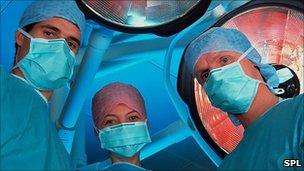NHS errors mean 57 patients had ops on wrong body part
- Published

That was the right patient wasn't it?
Fifty-seven patients underwent operations on the wrong part of their body last year due to NHS errors, figures show.
The National Patient Safety Agency says these were some of the 111 so-called "never events" in 2009-2010.
These are very serious, preventable patient safety incidents which the government says should not occur.
The Department of Health has added 14 other kinds of incidents to the official list, taking it to 22.
The list includes medical instruments and swabs left in the body after surgery, the wrong route of administration of chemotherapy, death or injury resulting from the transfusion of the wrong blood type and death by falls from unrestricted windows in places such as mental health hospitals.
Hospitals can have funding withheld if a never event occurs.
Wrong-site surgery refers to an operation on the wrong limb or organ (for example wrong knee, wrong eye, wrong kidney) or on the wrong person.
After wrong-site surgery, the second highest number of never events (41) related to misplaced feeding tubes in adults and children.
This puts patients at risk of being fed directly into the respiratory tract.
'Unsafe care'
Data on never events from previous years was collected differently and cannot be compared, according to the National Patient Safety Agency (NPSA).
Health minister Simon Burns said that unsafe care must not be tolerated.
"We are committed to extending the system of 'never events'. We will introduce clear disincentives through non-payments, just as there will be clear incentives for quality.
"Across the NHS there must be a culture of patient safety above all else. These measures will help to protect patients and give commissioners the powers to take action if unacceptable mistakes happen."
NHS Medical Director, Professor Sir Bruce Keogh, agreed: "Never events by their very name should never occur in a modern NHS.
"The proposed list includes avoidable incidents with serious adverse consequences for patients. No one wants these to happen, therefore we will not pay hospitals when these events occur.
"This will send a strong signal to leaders of the organisation to learn from their mistakes so they don't happen again," he said.